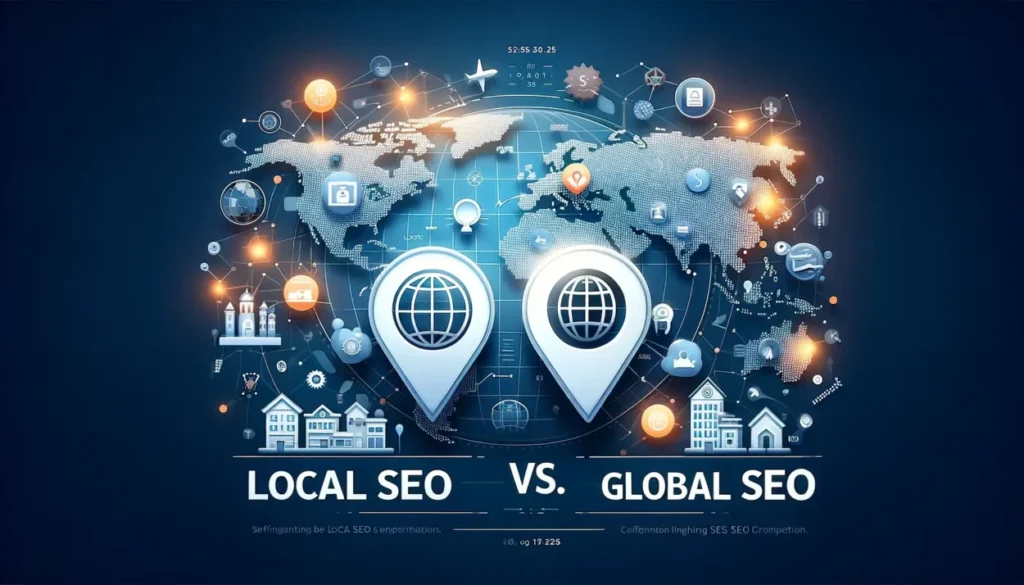The modern internet feels like an unending maze of information, a sprawling cityscape of websites vying for attention. But fear not, weary traveler! SEO, the secret cartographer, holds the key to navigating this digital wilderness. Yet, the map reveals two distinct paths: one leading to a cozy, vibrant village, the other a sprawling metropolis buzzing with global trade. This, dear reader, is the crux of the SEO game – Local SEO vs. Global SEO: a battlefield where keywords are weapons and rankings are your prize.
Are you a baker, a plumber, a local hero? Then local SEO is your compass. Picture your website as your charming shop, Google My Business as your town square, and those glowing reviews as happy customers singing your praises. Here, “best cake near me” is your battle cry, and neighborhood fame your ultimate treasure.
But do you dream of bigger markets, broader horizons? Global SEO beckons with its siren song of international reach. Think sleek e-commerce empires and brands that span continents. Your website transforms into a sleek spaceship, technical SEO your fuel, and backlinks from foreign lands your fuel depots. Here, “eco-friendly clothing online” is your war cry, and global brand dominance your ultimate victory.
So, where do you plant your banner? Whether you crave the warmth of local loyalty or the thrill of global conquest, this article will be your guide. We’ll delve into the nitty-gritty of keyword strategies, optimization tactics, and the unique landscapes of each SEO realm. By the end, you’ll be armed with the knowledge to chart your course, claim your corner of the web, and emerge victorious from the SEO labyrinth.
Buckle up, adventurer! It’s time to conquer the digital frontier, one search at a time.
What is Local SEO?
Local SEO is a type of search engine optimization that focuses on improving a website’s visibility in search results for queries related to a specific geographic location. For example, if you own a restaurant in San Francisco, you would want to optimize your website so that it appears prominently in search results for queries like “best restaurants in San Francisco” or “pizza near me.”
Local SEO is important for businesses that want to attract customers from their local area. By optimizing your website for local SEO, you can increase the visibility of your website in search results, which can lead to more traffic and sales.
What is Global SEO?
Global SEO is the process of optimizing a website for search results worldwide. This involves optimizing the website’s content, structure, and technical elements for search engines that are used in different countries and regions.
Global SEO is important for businesses that want to reach a global audience. By optimizing their website for global search engines, businesses can ensure that their website appears in search results for people who are searching for products or services in their target markets.
Here are some of the key elements of global SEO:
- Optimizing the website’s content for keywords that are relevant to the target audience
- Structuring the website in a way that is easy for search engines to crawl and index
- Optimizing the website’s technical elements, such as the title tag, meta descriptions, and headings
Differences Between Local SEO and Global SEO
Local SEO and Global SEO are two distinct strategies employed to improve a website’s online visibility, but they cater to vastly different audiences and have unique approaches. Here’s a breakdown of their key differences:
Target Audience:
- Local SEO: Focuses on attracting customers within a specific geographic area, like a city, town, or region. Think brick-and-mortar stores, restaurants, or local service providers.
- Global SEO: Aims for a wider audience on a national or international scale. This targets websites offering online products, services, or information not restricted by location.
Keywords:
- Local SEO: Utilizes location-specific keywords like “best pizza near me” or “plumber in [city name]”.
- Global SEO: Employs broader, more generic keywords like “SEO tips” or “e-commerce platforms”.
Website Optimization:
- Local SEO: Prioritizes optimizing your website for local search engines, including claiming and managing Google My Business listing, ensuring NAP (Name, Address, Phone) consistency across platforms, and acquiring local reviews.
- Global SEO: Focuses on technical SEO aspects like website speed, mobile-friendliness, and building backlinks from high-authority websites across various geographic regions.
Competition:
- Local SEO: Generally faces lesser competition compared to global SEO, as it targets a smaller geographic area.
- Global SEO: Encounters intense competition from websites worldwide, requiring more sophisticated optimization strategies.
Benefits:
- Local SEO: Increases website visibility within your local area, attracts nearby customers, and drives foot traffic to brick-and-mortar businesses.
- Global SEO: Expands your reach to a wider audience, potentially boosts sales and brand awareness internationally.
Which is Better for Your Business?
There is no one-size-fits-all answer to this question, as the best SEO strategy for your business will depend on your specific goals and needs. However, in general, local SEO is more important for businesses that are targeting customers in a specific geographic area, while global SEO is more important for businesses that are targeting customers worldwide.
If you are a local business, you should focus on optimizing your website for local search results by using relevant keywords, optimizing your website for mobile devices, and building backlinks to your website from other local businesses.
If you are a global business, you should focus on optimizing your website for global search results by using relevant keywords, optimizing your website for multiple languages, and building backlinks to your website from other high-quality websites.
Ultimately, the best way to determine which SEO strategy is right for your business is to conduct a thorough keyword research and competitive analysis. This will help you identify the keywords that your target audience is searching for, and the strategies that your competitors are using to rank for those keywords.
Beyond Google: Conquering the Global SEO Landscape
While Google reigns supreme with a staggering 76.14% of the search engine market share, it’s crucial to remember that it’s not the only game in town. Different regions have their own preferred search engines, and ignoring them could significantly limit your global reach. Here’s a glimpse into the diverse world of search beyond Google:
Baidu: The Chinese Giant
Holding over 200 million daily active users, Baidu is the undisputed king of search in China. To tap into this massive market, you’ll need to tailor your SEO strategy to its specific algorithms and user preferences. This might involve using Chinese keywords, adapting your website’s design for mobile-first browsing (as Baidu prioritizes mobile search), and building backlinks from authoritative Chinese websites.
Yahoo! Japan: A Local Powerhouse
Despite facing global competition, Yahoo! Japan remains a dominant force in the Japanese market, boasting an average monthly reach of 68.9%. To succeed here, consider using Japanese keywords, translating your website content into Japanese, and optimizing for local search terms like “best [product/service] near me.” Building relationships with Japanese influencers and publishers can also be highly beneficial.
Yandex: Russia’s Gatekeeper
With 31% of internet users in Russia relying on Yandex for their searches, ignoring it would be a major misstep. To gain visibility in this market, adapt your content to the Cyrillic alphabet, use Yandex-specific keywords, and ensure your website is mobile-friendly (Yandex prioritizes mobile search like Baidu). Partnering with Russian digital marketing agencies can provide valuable insights into the local SEO landscape.
Remember, global SEO is not a one-size-fits-all approach. By understanding the nuances of different search engines and user preferences in each region, you can craft a targeted strategy that unlocks new markets and propels your brand to global success. So, step outside the Google bubble and embrace the exciting world of international search!
How to Do Local SEO?
Local SEO is all about optimizing your website for search results in a specific geographic area. This means that you need to make sure that your website is relevant to the people who are searching for businesses in your area. Here are some tips on how to do local SEO:
Use relevant keywords in your website content.
When you’re writing content for your website, make sure to use relevant keywords that people in your target audience are likely to search for. For example, if you’re a local plumber, you might want to include keywords like “plumber near me” or “emergency plumber.”
Optimize your website for mobile devices.
More and more people are using their mobile devices to search for information online, so it’s important to make sure that your website is optimized for mobile devices. This means that your website should be easy to navigate and load quickly on mobile devices.
Build backlinks to your website.
Backlinks are a valuable way to improve your website’s ranking in search engine results pages (SERPs). You can build backlinks by submitting your website to directories, exchanging links with other websites, and writing guest posts on other websites.
Claim your business listing on Google My Business.
Google My Business is a free service that allows you to manage your business listing on Google Maps and Search. When you claim your business listing, you can add information about your business, such as your hours of operation, phone number, and website address. You can also upload photos of your business and respond to customer reviews.
Optimize your website for local search features.
Google and other search engines offer a variety of local search features, such as local business listings, maps, and directories. You can optimize your website for these features by adding relevant keywords to your website content, including your business name, address, and phone number. You can also add schema markup to your website, which is a type of code that helps search engines understand the information on your website.
Tips for Combining Local SEO and Global SEO
Here are some tips for combining local SEO and global SEO:
- Use relevant keywords in your website content. When you’re writing content for your website, make sure to use relevant keywords that people in your target audience are likely to search for.
- Optimize your website for mobile devices. More and more people are using their mobile devices to search for information online, so it’s important to make sure that your website is optimized for mobile devices.
- Build backlinks to your website. Backlinks are a valuable way to improve your website’s ranking in search engine results pages (SERPs). You can build backlinks by submitting your website to directories, exchanging links with other websites, and writing guest posts on other websites.
- Use social media to promote your business. Social media is a great way to connect with your customers and promote your business. Make sure to post regularly on social media and use relevant hashtags to reach a wider audience.
- Optimize your website for local search engines. Local search engines are different from global search engines, so it’s important to optimize your website for local search engines. You can do this by including your city or town in your website’s title tag, meta description, and other important on-page elements.
- Claim your business listing on Google My Business. Google My Business is a free service that allows you to manage your business listing on Google. When you claim your business listing, you can add information about your business, including your address, phone number, hours of operation, and website. You can also upload photos of your business and respond to customer reviews.
- Create unique and valuable content. The best way to rank high in search engines is to create unique and valuable content that will interest your target audience.
- Optimize your website for speed. A slow-loading website will not only frustrate your visitors, but it will also hurt your search engine ranking.
- Get involved in your community. Attend local events, speak at local organizations, and volunteer your time. Getting involved in your community will help you build relationships with potential customers and boost your local SEO ranking.
Conclusion
In conclusion, local SEO and global SEO are two important tools that businesses can use to reach different audiences. By understanding the differences between the two types of SEO, and by optimizing their websites accordingly, businesses can improve their visibility in search engine results pages (SERPs) and attract more customers.
Here are some key takeaways from this guide:
- Local SEO focuses on optimizing a website for search results in a specific geographic area, while global SEO focuses on optimizing a website for search results worldwide.
- Local SEO can help businesses attract more customers from their local area, while global SEO can help businesses reach a wider audience.
- Both local SEO and global SEO are important for businesses of all sizes.


















